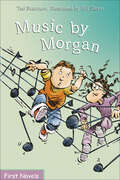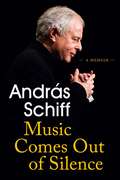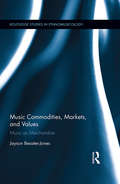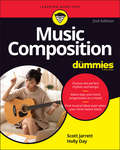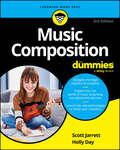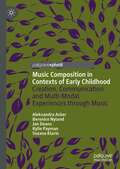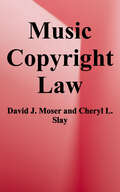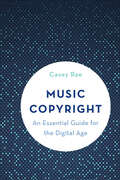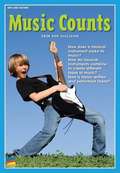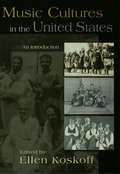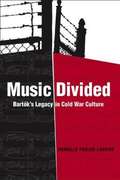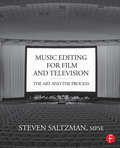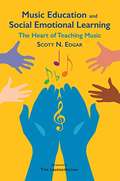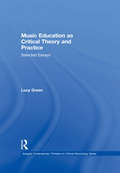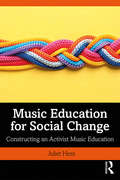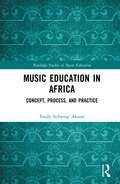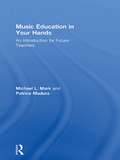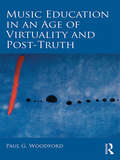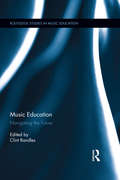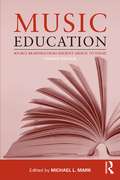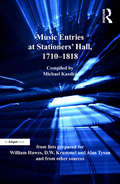- Table View
- List View
Music By Morgan (Formac First Novels)
by Ted StauntonMorgan is not pleased when his parents sign him up to play floor hockey at the community center; he stinks at hockey and it's no fun. So when Aldeen Hummel, the Godzilla of Grade Three and a good hockey player, is unhappily signed up for piano lessons, Morgan crafts a plan to trade places.
Music Comes Out of Silence: A Memoir
by Andras SchiffAndras Schiff is one of the most important pianists of our time. This stimulating account of his life and work, told in two parts, takes readers on an intimate journey from Schiff's childhood in Hungary through to the present day.In conversationw with Martin Meyer, Schiff discusses a diverse range of topics from his experiences with anti-Semitism and communist rule to his musical training with maestros such as Pál Kadosa and Ferenc Rados, as well as his thoughts on playing techniques and musical interpretation.In a collection of Schiff's writings we are enthralled by a guided tour of Bach's 'Goldberg' Variations, sobered by Schiff's public defiance against nationalistic and racist attitudes - to the extent that he refused to perform in Haider's Austria or Orban's Hungary - and delighted by the playful 'Ten Commandments' for concertgoers.More than a memoir, this is a seminal compilation of the thoughts and experiences of one of the greatest musicians of our time, of his inimitable art of making music out of silence.
Music Comes Out of Silence: A Memoir
by Andras SchiffAndras Schiff is one of the most important pianists of our time. This stimulating account of his life and work, told in two parts, takes readers on an intimate journey from Schiff's childhood in Hungary through to the present day.In conversationw with Martin Meyer, Schiff discusses a diverse range of topics from his experiences with anti-Semitism and communist rule to his musical training with maestros such as Pál Kadosa and Ferenc Rados, as well as his thoughts on playing techniques and musical interpretation.In a collection of Schiff's writings we are enthralled by a guided tour of Bach's 'Goldberg' Variations, sobered by Schiff's public defiance against nationalistic and racist attitudes - to the extent that he refused to perform in Haider's Austria or Orban's Hungary - and delighted by the playful 'Ten Commandments' for concertgoers.More than a memoir, this is a seminal compilation of the thoughts and experiences of one of the greatest musicians of our time, of his inimitable art of making music out of silence.
Music Commodities, Markets, and Values: Music as Merchandise (Routledge Studies in Ethnomusicology)
by Jayson Beaster-JonesThis book examines music stores as sites of cultural production in contemporary India. Analyzing social practices of selling music in a variety of retail contexts, it focuses upon the economic and social values that are produced and circulated by music retailers in the marketplace. Based upon research conducted over a volatile ten-year period of the Indian music industry, Beaster-Jones discusses the cultural histories of the recording industry, the social changes that have accompanied India’s economic liberalization reforms, and the economic realities of selling music in India as digital circulation of music recordings gradually displaced physical distribution. The volume considers the mobilization of musical, economic, and social values as a component of branding discourses in neoliberal India, as a justification for new regimes of legitimate use and intellectual property, as a scene for the performance of cosmopolitanism by shopping, and as a site of anxiety about transformations in the marketplace. It relies upon ethnographic observation and interviews from a variety of sources within the Indian music industry, including perspectives of executives at music labels, family-run and corporate music stores, and hawkers in street markets selling counterfeit recordings. This ethnography of the practices, spaces, and anxieties of selling music in urban India will be an important resource for scholars in a wide range of fields, including ethnomusicology, anthropology, popular music studies, and South Asian studies.
Music Composition For Dummies
by Holly Day Scott JarrettYou can hum it, but can you write it down? When most people think of a composer, they picture a bewigged genius like Mozart or Beethoven frenetically directing mighty orchestras in the ornate palaces of Vienna. While that may have been the case once upon a time, modern composers make themselves heard far beyond the classical conservatoire and concert hall. These days, soundtracks are in high demand in industries such as TV, film, advertising, and even gaming to help create immersive and exciting experiences. Whatever your musical ambitions—composing a dark requiem in a beautiful Viennese apartment or producing the next great Star Wars-like movie theme in LA—the fully updated Music Composition For Dummies hits all the right notes to help you become confident in the theory and practice of composition. To help you translate your musical ideas from fleeting tunes in your head to playable bars and notation on paper, professional composer and instructor Scott Jarrett and music journalist Holly Day take you on a friendly step-by-step journey through the process of musical creation, including choosing the right rhythms and tempos, creating melodies and chord progressions, and working with instruments and voices. You’ll learn how to match keys and chords to mood, use form to enhance your creativity, and write in different styles from pop to classical—and you’ll even learn how to keep hammering away when inspiration eludes you. Organize and preserve your musical ideas Formalize your knowledge with professional vocabulary Get familiar with composition apps and software Make a demo and market on social media Filled with musical exercises to help you acquire the discipline you need for success, Music Composition For Dummies has everything you need to turn your inner soundtrack into a tuneful reality!
Music Composition For Dummies
by Holly Day Scott JarrettCreate the next big pop hit, bang out a catchy jingle, or write an iconic film score, with music composition skills Today's composers create music for television, film, commercials, and even video games. Music Composition For Dummies brings you up to speed with the theory and technicality of composing music. With easy-to-understand content that tracks to a typical music composition intro course, this book will teach you how to use music theory to write music in a variety of forms. You'll discover the latest tech tools for composers, including composing software and online streaming services where you can publish your musical creations. And you'll get a rundown on the world of intellectual property, so you can collab and remix fairly, while retaining all the rights to your own creations. Get a clear introduction to music theory and songwriting concepts Learn about composition best practices for movies, TV, video games, and beyond Explore sample music to help you understand both artistic and commercial composition Launch into the latest technologies to mix and share your creations Great for music students and aspiring artists, Music Composition For Dummies, is an easy-to-read guide to writing and producing all kinds of tunes.
Music Composition in Contexts of Early Childhood: Creation, Communication and Multi-Modal Experiences through Music
by Jan Deans Berenice Nyland Aleksandra Acker Kylie Payman Suzana KlarinThis book explores the narratives of a group of four-year-old children in a composition project in an Australian early learning centre. The participants, centre staff and a composer, Stephen Leek, contributed a number of music sessions for the children, including five original songs. The book showcases young children’s communicative ability and sensitivity to wider issues. The staff in the centre have a strongly voiced philosophy that is enacted through arts-based pedagogy and incorporates significant themes including a respect for Aboriginal culture and custodial responsibility towards a sustainable future for the earth. Examples of adult and children’s ideas are illustrated through music making, singing, dancing, words, drawings and paintings, which provide insights into a world where children are viewed as active citizens and the arts have rights. The book describes the context of the centre, the history of projects and details one project as an example of “lifeworthy learning”.
Music Copyright Law
by David J. Moser Cheryl L. SlayGain an in-depth understanding of a topic that is vital to the success of anyone in or entering the music industry, with Music Copyright Law. <p><p>From songwriters and performers to managers, producers, and agents - everyone is affected by the issues covered in this book. Avoiding the technical jargon and "lawyer-speak" that bogs down other books on the subject, the book explores the world of copyright law and hones in on how it applies to music. It begins by building a foundational knowledge of the fundamentals of copyright law, what it protects, the benefits of registering a copyright, and what to do when copyright has been infringed. <p><p>Once the fundamentals are established, coverage expands to include controversies involving copyright and music in the digital age and the debates over online music. Packed with practical examples that bring complex concepts to life, this book is a must-have for any professional in or entering music business.
Music Copyright: An Essential Guide for the Digital Age
by Casey RaeToday’s music marketplace is more complex than any previous era. It’s easy to feel paralyzed by the plethora of digital services and business models, to say nothing of corresponding revenue streams—all of which are established by copyright. In simple and easy-to-read language, Music Copyright: An Essential Guide for the Digital Age takes readers step-by-step through the world of music copyright, imparting tools to navigate this intricate system. Casey Rae demystifies the laws, business practices, and trends that enable—and sometimes frustrate—a rapidly evolving industry and empowers music creators, managers, and entrepreneurs to make informed decisions.
Music Counts
by Pam Hirschfeld Erin Ash SullivanFind out about various aspects of music, the people who make music, and the different types of musical instruments.
Music Cultures in the United States: An Introduction
by Ellen KoskoffMusic Cultures in the United States is a basic textbook for an Introduction to American Music course. Taking a new, fresh approach to the study of American music, it is divided into three parts. In the first part, historical, social, and cultural issues are discussed, including how music history is studied; issues of musical and social identity; and institutions and processes affecting music in the U.S. The heart of the book is devoted to American musical cultures: American Indian; European; African American; Latin American; and Asian American. Each cultural section has a basic introductory article, followed by case studies of specific musical cultures. Finally, global musics are addressed, including Classical Musics and Popular Musics, as they have been performed in the U.S..Each article is written by an expert in the field, offering in-depth, knowledgeable, yet accessible writing for the student. The accompanying CD offers musical examples tied to each article. Pedagogic material includes chapter overviews, questions for study, and a chronoloogy of key musical events in American music and definitions in the margins.
Music Divided: Bartok's Legacy in Cold War Culture
by Danielle Fosler-LussierMusic Divided explores how political pressures affected musical life on both sides of the Iron Curtain during the early years of the cold war. In this groundbreaking study, Danielle Fosler-Lussier illuminates the pervasive political anxieties of the era through particular attention to artistic, music-theoretical, and propagandistic responses to the music of Hungary's most renowned twentieth-century composer, Bela Bartok. She shows how a tense period of political transition plagued Bartok's music and imperiled those who took a stand on its aesthetic value in the emerging socialist state. Her fascinating investigation of Bartok's reception outside of Hungary demonstrates that Western composers, too, formulated their ideas about musical style under the influence of ever-escalating cold war tensions.
Music Editing for Film and Television: The Art and the Process
by Steven SaltzmanMaking music for the movies is a complicated, involved, and challenging process. Music Editing for Film and Television covers the practical skills needed to successfully hone your craft. Through an overview of the music editing process, this book will equip you with detailed techniques to solve musical problems encountered during editing. An abundance of interviews with well-known professionals provide a wide range of perspectives on music editing for film, while special features address an array of projects, from a low-budget documentary, to a Hollywood blockbuster, to indie projects.
Music Education and Social Emotional Learning Workbook
by Scott EdgarMusic Education and Social Emotional Learning: The Heart of Teaching Music. Student workbook
Music Education and Social Emotional Learning: The Heart of Teaching Music
by Scott N. EdgarMusic educators are in a prime position to help students become socially and emotionally competent while at the same time develop excellent musicianship. For every child to be successful in the music classroom, teachers need to be aware of the whole student. How do music educators create success when students every day struggle with social awareness, bullying, communication, problem solving, and other challenges.
Music Education as Critical Theory and Practice: Selected Essays (Ashgate Contemporary Thinkers On Critical Musicology Ser.)
by Lucy GreenThis collection of previously published articles, chapters and keynotes traces both the theoretical contribution of Lucy Green to the emergent field of the sociology of music education, and her radical �hands-on� practical work in classrooms and instrumental studios. The selection contains a mixture of material, from essays that have appeared in major journals and books, to some harder-to-find publications. It spans issues from musical meaning, ideology, identity and gender in relation to music education, to changes and challenges in music curricula and pedagogy, and includes Green�s highly influential work on bringing informal learning into formal music education settings. A newly-written introduction considers the relationship between theory and practice, and situates each essay in relation to some of the major influences, within and beyond the field of music education, which affected Green�s own intellectual journey from the 1970s to the present day.
Music Education for Social Change: Constructing an Activist Music Education
by Juliet HessMusic Education for Social Change: Constructing an Activist Music Education develops an activist music education rooted in principles of social justice and anti-oppression. Based on the interviews of 20 activist-musicians across the United States and Canada, the book explores the common themes, perceptions, and philosophies among them, positioning these activist-musicians as catalysts for change in music education while raising the question: amidst racism and violence targeted at people who embody difference, how can music education contribute to changing the social climate? Music has long played a role in activism and resistance. By drawing upon this rich tradition, educators can position activist music education as part of a long-term response to events, as a crucial initiative to respond to ongoing oppression, and as an opportunity for youth to develop collective, expressive, and critical thinking skills. This emergent activist music education—like activism pushing toward social change—focuses on bringing people together, expressing experiences, and identifying (and challenging) oppressions. Grounded in practice with examples integrated throughout the text, Music Education for Social Change is an imperative and urgent consideration of what may be possible through music and music education.
Music Education for Social Change: Constructing an Activist Music Education
by Juliet HessMusic Education for Social Change: Constructing an Activist Music Education develops an activist music education rooted in principles of social justice and anti-oppression. Based on the interviews of 20 activist-musicians across the United States and Canada, the book explores the common themes, perceptions, and philosophies among them, positioning these activist-musicians as catalysts for change in music education while raising the question: amidst racism and violence targeted at people who embody difference, how can music education contribute to changing the social climate? Music has long played a role in activism and resistance. By drawing upon this rich tradition, educators can position activist music education as part of a long-term response to events, as a crucial initiative to respond to ongoing oppression, and as an opportunity for youth to develop collective, expressive, and critical thinking skills. This emergent activist music education—like activism pushing toward social change—focuses on bringing people together, expressing experiences, and identifying (and challenging) oppressions. Grounded in practice with examples integrated throughout the text, Music Education for Social Change is an imperative and urgent consideration of what may be possible through music and music education.
Music Education in Africa: Concept, Process, and Practice (Routledge Studies in Music Education)
by Emily Achieng’ AkunoThis book explores the music of Africa and its experience in modern education, offering music education analyses from African perspectives. The collection assembles insights from around Africa to bring African and non-African scholars into the world of music, education, policy, and assessment as played out across the continent. The music of Africa presents multiple avenues for the understanding of the reality of life from a cultural perspective. The teaching and learning of this music closely follows its practice, the latter involving a combination of artistic expressions. With international interest in world music, there is need to engage with concepts and processes of this music. The volume offers new research from culture bearers, scholars, and educators rooted in practices that provide deeper perceptions of the cultural expression of music. With sections focusing on Concepts in Musical Arts, Musical Arts Processes, and Music Education Practice, it captures and documents the concept of musical arts from an African experiential perspective. Articulating the processes of musical arts and their implications for teaching and learning in both African and international learning contexts, it presents a balanced view of music as a phenomenon and generates material for discussion. A valuable resource for those seeking insight into aspects of music practice in Africa, this book will appeal to scholars of Music Education, Ethnomusicology, Community Music, African Studies, and African Music.
Music Education in Your Hands: An Introduction for Future Teachers
by Michael L. Mark Patrice MaduraMusic Education in Your Hands is a textbook for the introductory course in Music Education. Written for future classroom music teachers, the book provides an overview of the music education system , illuminating the many topics that music educators need to know, including technology, teaching methods, curricular evolution, legislation, and a range of societal needs from cultural diversity to evolving tastes in music. It encompasses a broad picture of the profession, and how the future of music education rests in the hands of today’s student teachers as they learn how to become advocates for music in our schools. FEATURES A balance of sound historical foundations with recent research and thinking; Coursework that is appropriate in level and length for a one semester introductory course; Actual dialogue between undergraduate music education majors and teachers, illustrating pertinent issues teachers must face; An emphasis on opportunities in the greater community beyond the walls of the school that music teachers should be familiar with; Suggested topics for activities and critical thinking for every chapter; A companion web site including student and instructor resources
Music Education in an Age of Virtuality and Post-Truth
by Paul G. WoodfordThis is a deliberately provocative book crossing many disciplinary boundaries and locating music and art education within a context of contemporary social and political problems in a time of growing disruption and authoritarianism. Intended firstly for music teacher educators, practicing music teachers, and graduate and undergraduate music education majors, the book also speaks to arts and media studies teachers, parents, or others interested in exploring how composing, performing, improvising, conducting, listening, dancing, teaching, learning, or engaging in music or education criticism are all political acts because fundamentally concerned with social values and thus inseparable from power and politics. Among the book’s central themes are the danger of democratic deconsolidation in the West and how music education can help counter that threat through the fostering of democratic citizens who are aware of music’s ubiquity in their lives and its many roles in shaping public opinion and notions of truth, and for better or for worse! The arts can obviously be used for ill, but as George Orwell demonstrated in his own work, they can also be employed in defense of democracy as modes of political thought and action affording opportunities for the revitalization of society through its re-imagining.
Music Education: Navigating the Future (Routledge Studies in Music Education #1)
by Clint RandlesEducation involving music is a multifaceted and ever-altering challenge. As new media, technologies, and pedagogies are developed, academics and practitioners must make sure that they are aware of current trends and where they might lead. This book features studies on the future of music education from emerging scholars in the field. These studies are then supplemented by commentaries from established leaders of the music education community. Music Education covers topics such as music and leisure, new forms of media in music teaching and learning, the role of technology in music learning, popular music tuition in the expansion of curricular offering, and assessment of music education research. As such, it is an excellent reference for scholars and teachers as well as guide to the future of the discipline.
Music Education: Source Readings from Ancient Greece to Today
by Michael L. MarkMusic Education: Source Readings from Ancient Greece to Today is a collection of thematically organized essays that illuminate the importance of music education to individuals, communities and nations. The fourth edition has been expanded to address the significant societal changes that have occurred since the publication of the last edition, with a greater focus on current readings in government, philosophy, psychology, curriculum, sociology, and advocacy. This comprehensive text remains an essential reference for music educators today, demonstrating the value and support of their profession in the societies in which they live.
Music Entries at Stationers' Hall, 1710–1818: from lists prepared for William Hawes, D.W. Krummel and Alan Tyson and from other sources
by Michael KasslerThe British Copyright Act of 1709 protected proprietors of books and music printed after 10 April 1710 who gave copies to the Company of Stationers in London. Upon receipt of a copy, usually within days of its first publication, the Stationers' Hall warehouse keeper entered details into a register. They included the date of registration, the name of the work's proprietor (its author or, if copyright had been transferred, its publisher), and the work's full title, which normally named the composer and the writer of any text and often named the work's performers and dedicatee. Although some publishers put the words 'Entered at Stationers' Hall' on title-pages without actually depositing copies, the information in the registers about the many works that were registered has significant bibliographic value. Because the music entries have not previously been printed and access to them has been difficult, they generally have been ignored by cataloguers and scholars, with the consequence that numerous musical works of this period have been misdated in libraries and reference books. This book makes available, for the first time, the full text of the music entries at Stationers' Hall from 1710 to 1810 and abbreviated details of works entered from 1811 to 1818. Its value is enhanced by the inclusion of locations of copies of most works, together with indexes of composers, authors, performers and dedicatees, and an explanatory introduction by the compiler.
Music Everywhere! (Global Fund for Children Books)
by Maya Ajmera Cynthia Pon Elise Hofer DerstinePhotographs from around the world celebrate the universal joy that kids get from making music, whether they’re playing instruments, clapping their hands, stomping their feet, or singing. Music can help express one child’s feelings—or it can bring a whole community together.
